Hays Travel: Leadership, Management, and Talent in the Service Sector
VerifiedAdded on 2023/01/11
|15
|5146
|71
Report
AI Summary
This report provides a comprehensive analysis of leadership and management within Hays Travel, a prominent travel company. It begins with an introduction to talent management and its importance in the service sector, specifically highlighting its significance for Hays Travel. The report then assesses classical management theories, such as Weber's and Taylor's, and their impact on talent management within the organization. It explores the roles of leaders and different leadership styles, including democratic, autocratic, and laissez-faire approaches, within the tour operator industry. The report further reviews the management and leadership styles currently employed at Hays Travel and investigates internal and external factors influencing these styles and the organizational structure. A management report identifies common management roles, evaluates required hard and soft skills for effective talent management, and compares change management systems and leadership between Hays Travel and TUI. The conclusion summarizes the key findings and insights from the analysis, offering a holistic view of leadership and management practices in the context of Hays Travel and the broader service industry.
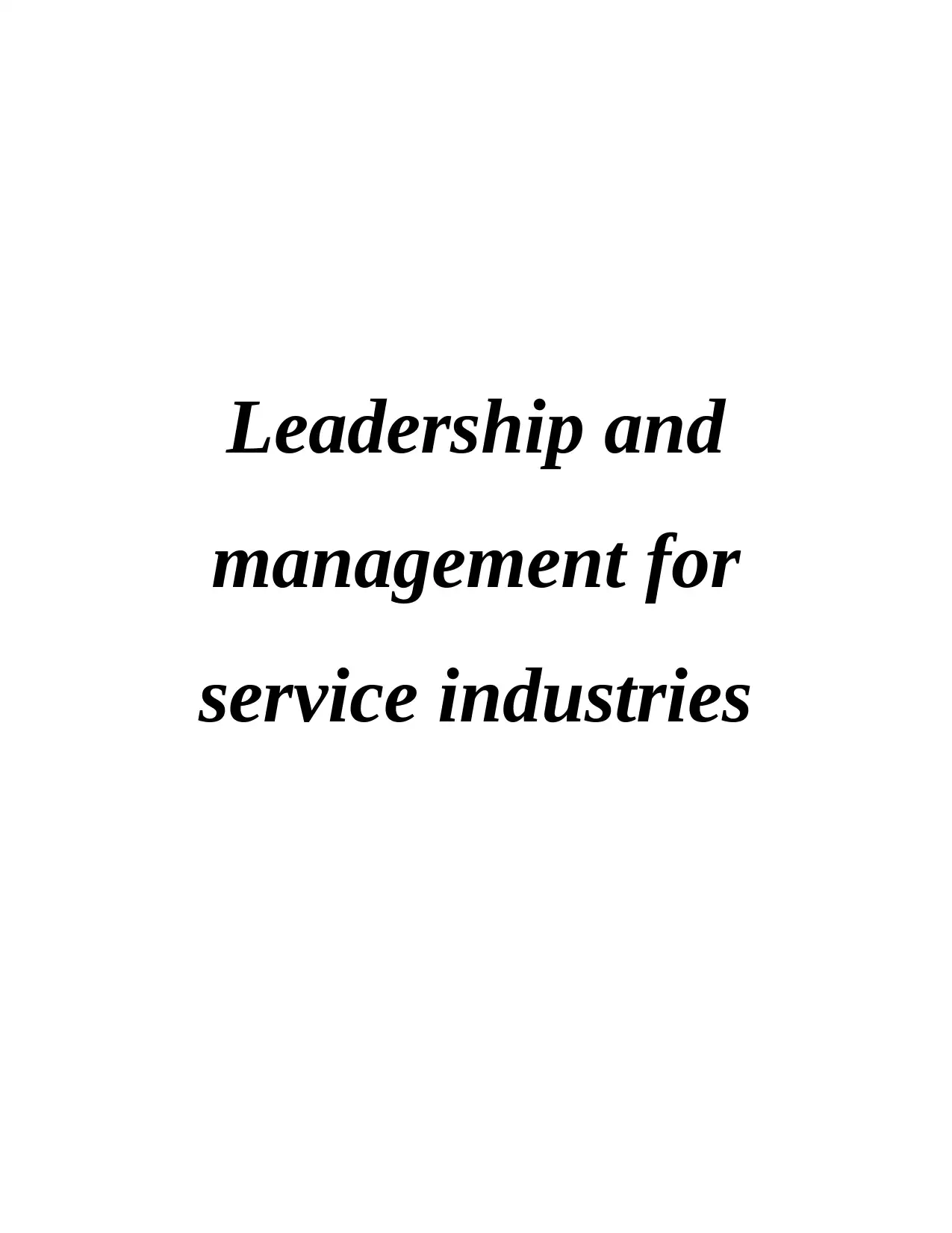
Leadership and
management for
service industries
management for
service industries
Paraphrase This Document
Need a fresh take? Get an instant paraphrase of this document with our AI Paraphraser
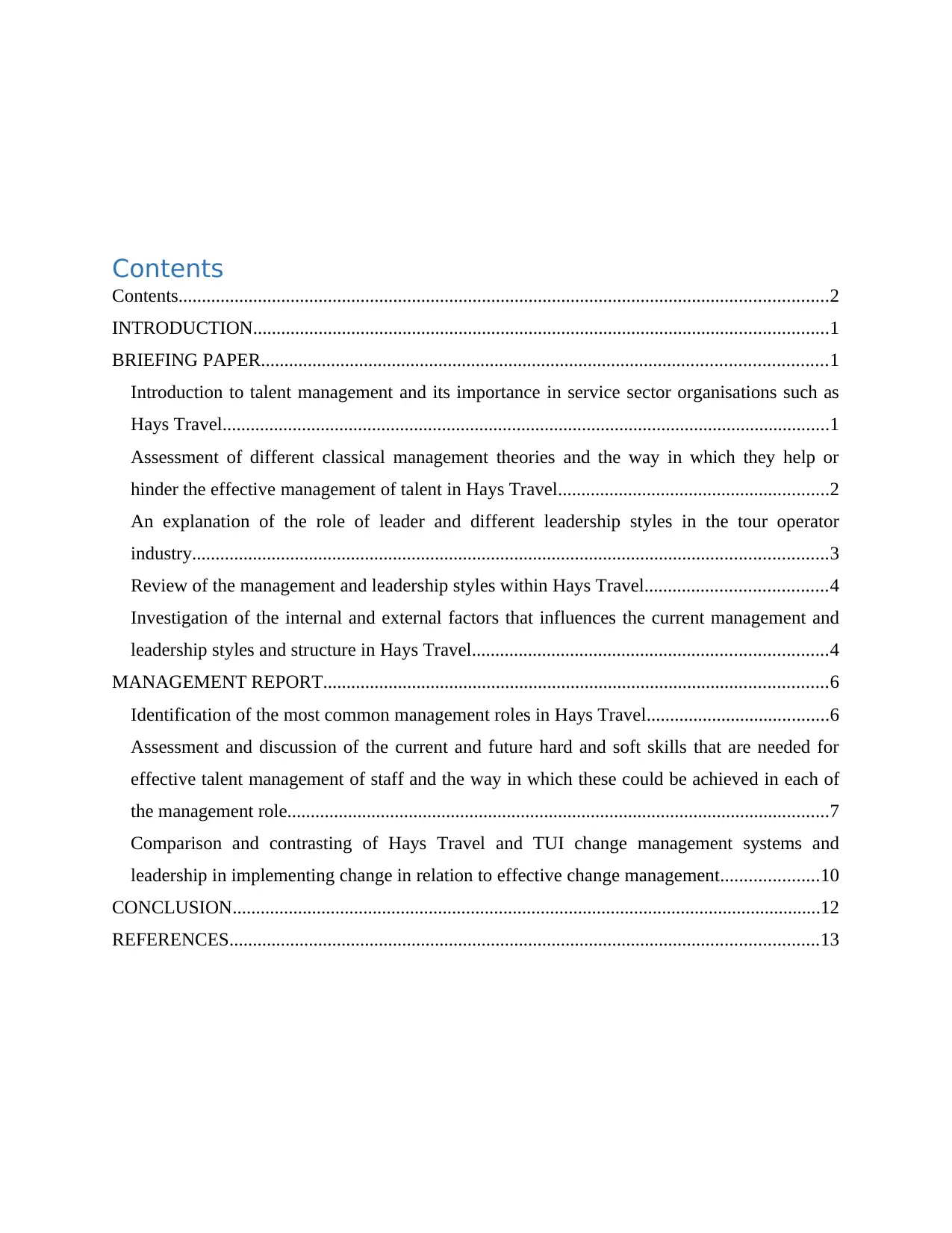
Contents
Contents...........................................................................................................................................2
INTRODUCTION...........................................................................................................................1
BRIEFING PAPER.........................................................................................................................1
Introduction to talent management and its importance in service sector organisations such as
Hays Travel..................................................................................................................................1
Assessment of different classical management theories and the way in which they help or
hinder the effective management of talent in Hays Travel..........................................................2
An explanation of the role of leader and different leadership styles in the tour operator
industry........................................................................................................................................3
Review of the management and leadership styles within Hays Travel.......................................4
Investigation of the internal and external factors that influences the current management and
leadership styles and structure in Hays Travel............................................................................4
MANAGEMENT REPORT............................................................................................................6
Identification of the most common management roles in Hays Travel.......................................6
Assessment and discussion of the current and future hard and soft skills that are needed for
effective talent management of staff and the way in which these could be achieved in each of
the management role....................................................................................................................7
Comparison and contrasting of Hays Travel and TUI change management systems and
leadership in implementing change in relation to effective change management.....................10
CONCLUSION..............................................................................................................................12
REFERENCES..............................................................................................................................13
Contents...........................................................................................................................................2
INTRODUCTION...........................................................................................................................1
BRIEFING PAPER.........................................................................................................................1
Introduction to talent management and its importance in service sector organisations such as
Hays Travel..................................................................................................................................1
Assessment of different classical management theories and the way in which they help or
hinder the effective management of talent in Hays Travel..........................................................2
An explanation of the role of leader and different leadership styles in the tour operator
industry........................................................................................................................................3
Review of the management and leadership styles within Hays Travel.......................................4
Investigation of the internal and external factors that influences the current management and
leadership styles and structure in Hays Travel............................................................................4
MANAGEMENT REPORT............................................................................................................6
Identification of the most common management roles in Hays Travel.......................................6
Assessment and discussion of the current and future hard and soft skills that are needed for
effective talent management of staff and the way in which these could be achieved in each of
the management role....................................................................................................................7
Comparison and contrasting of Hays Travel and TUI change management systems and
leadership in implementing change in relation to effective change management.....................10
CONCLUSION..............................................................................................................................12
REFERENCES..............................................................................................................................13
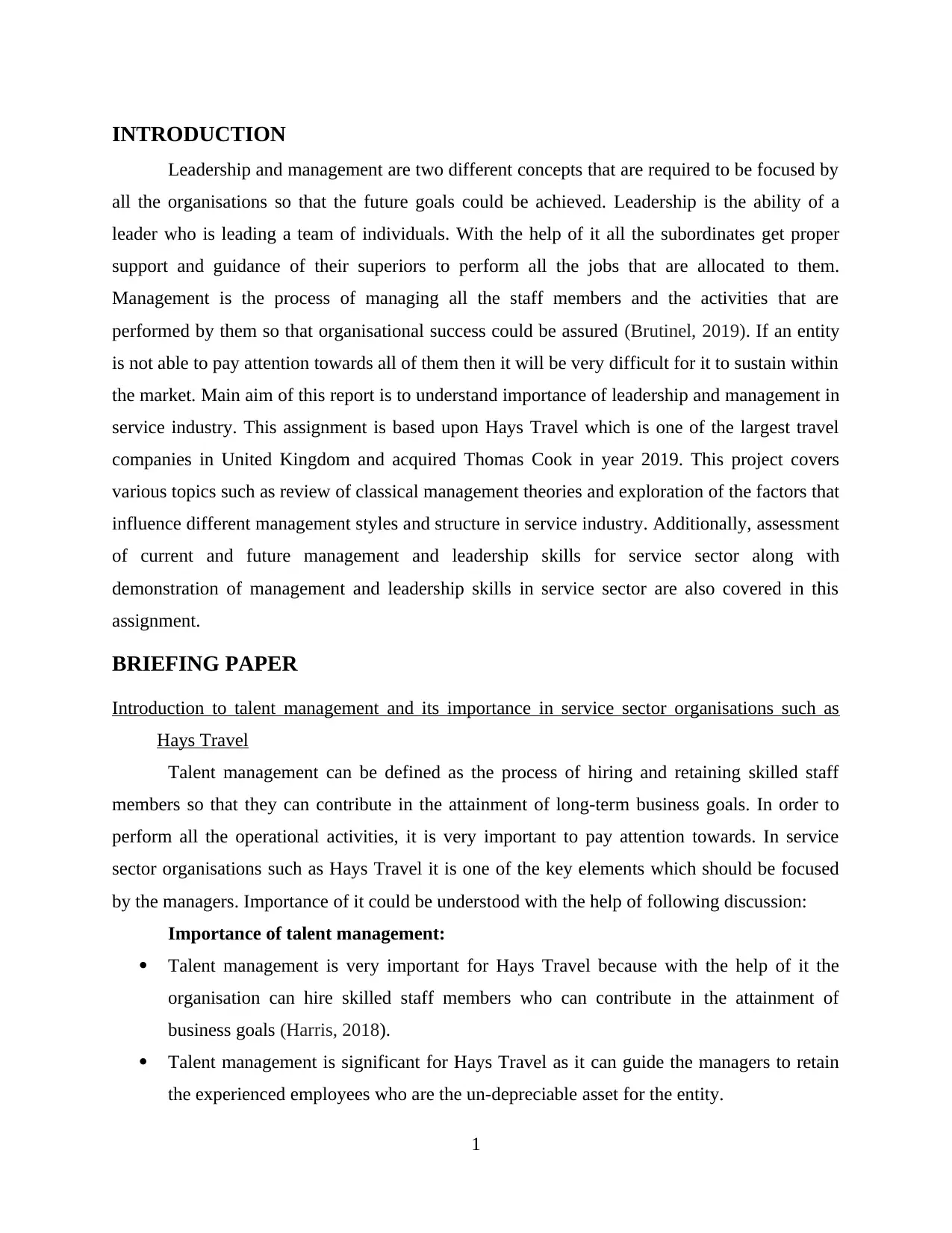
INTRODUCTION
Leadership and management are two different concepts that are required to be focused by
all the organisations so that the future goals could be achieved. Leadership is the ability of a
leader who is leading a team of individuals. With the help of it all the subordinates get proper
support and guidance of their superiors to perform all the jobs that are allocated to them.
Management is the process of managing all the staff members and the activities that are
performed by them so that organisational success could be assured (Brutinel, 2019). If an entity
is not able to pay attention towards all of them then it will be very difficult for it to sustain within
the market. Main aim of this report is to understand importance of leadership and management in
service industry. This assignment is based upon Hays Travel which is one of the largest travel
companies in United Kingdom and acquired Thomas Cook in year 2019. This project covers
various topics such as review of classical management theories and exploration of the factors that
influence different management styles and structure in service industry. Additionally, assessment
of current and future management and leadership skills for service sector along with
demonstration of management and leadership skills in service sector are also covered in this
assignment.
BRIEFING PAPER
Introduction to talent management and its importance in service sector organisations such as
Hays Travel
Talent management can be defined as the process of hiring and retaining skilled staff
members so that they can contribute in the attainment of long-term business goals. In order to
perform all the operational activities, it is very important to pay attention towards. In service
sector organisations such as Hays Travel it is one of the key elements which should be focused
by the managers. Importance of it could be understood with the help of following discussion:
Importance of talent management:
Talent management is very important for Hays Travel because with the help of it the
organisation can hire skilled staff members who can contribute in the attainment of
business goals (Harris, 2018).
Talent management is significant for Hays Travel as it can guide the managers to retain
the experienced employees who are the un-depreciable asset for the entity.
1
Leadership and management are two different concepts that are required to be focused by
all the organisations so that the future goals could be achieved. Leadership is the ability of a
leader who is leading a team of individuals. With the help of it all the subordinates get proper
support and guidance of their superiors to perform all the jobs that are allocated to them.
Management is the process of managing all the staff members and the activities that are
performed by them so that organisational success could be assured (Brutinel, 2019). If an entity
is not able to pay attention towards all of them then it will be very difficult for it to sustain within
the market. Main aim of this report is to understand importance of leadership and management in
service industry. This assignment is based upon Hays Travel which is one of the largest travel
companies in United Kingdom and acquired Thomas Cook in year 2019. This project covers
various topics such as review of classical management theories and exploration of the factors that
influence different management styles and structure in service industry. Additionally, assessment
of current and future management and leadership skills for service sector along with
demonstration of management and leadership skills in service sector are also covered in this
assignment.
BRIEFING PAPER
Introduction to talent management and its importance in service sector organisations such as
Hays Travel
Talent management can be defined as the process of hiring and retaining skilled staff
members so that they can contribute in the attainment of long-term business goals. In order to
perform all the operational activities, it is very important to pay attention towards. In service
sector organisations such as Hays Travel it is one of the key elements which should be focused
by the managers. Importance of it could be understood with the help of following discussion:
Importance of talent management:
Talent management is very important for Hays Travel because with the help of it the
organisation can hire skilled staff members who can contribute in the attainment of
business goals (Harris, 2018).
Talent management is significant for Hays Travel as it can guide the managers to retain
the experienced employees who are the un-depreciable asset for the entity.
1
⊘ This is a preview!⊘
Do you want full access?
Subscribe today to unlock all pages.

Trusted by 1+ million students worldwide
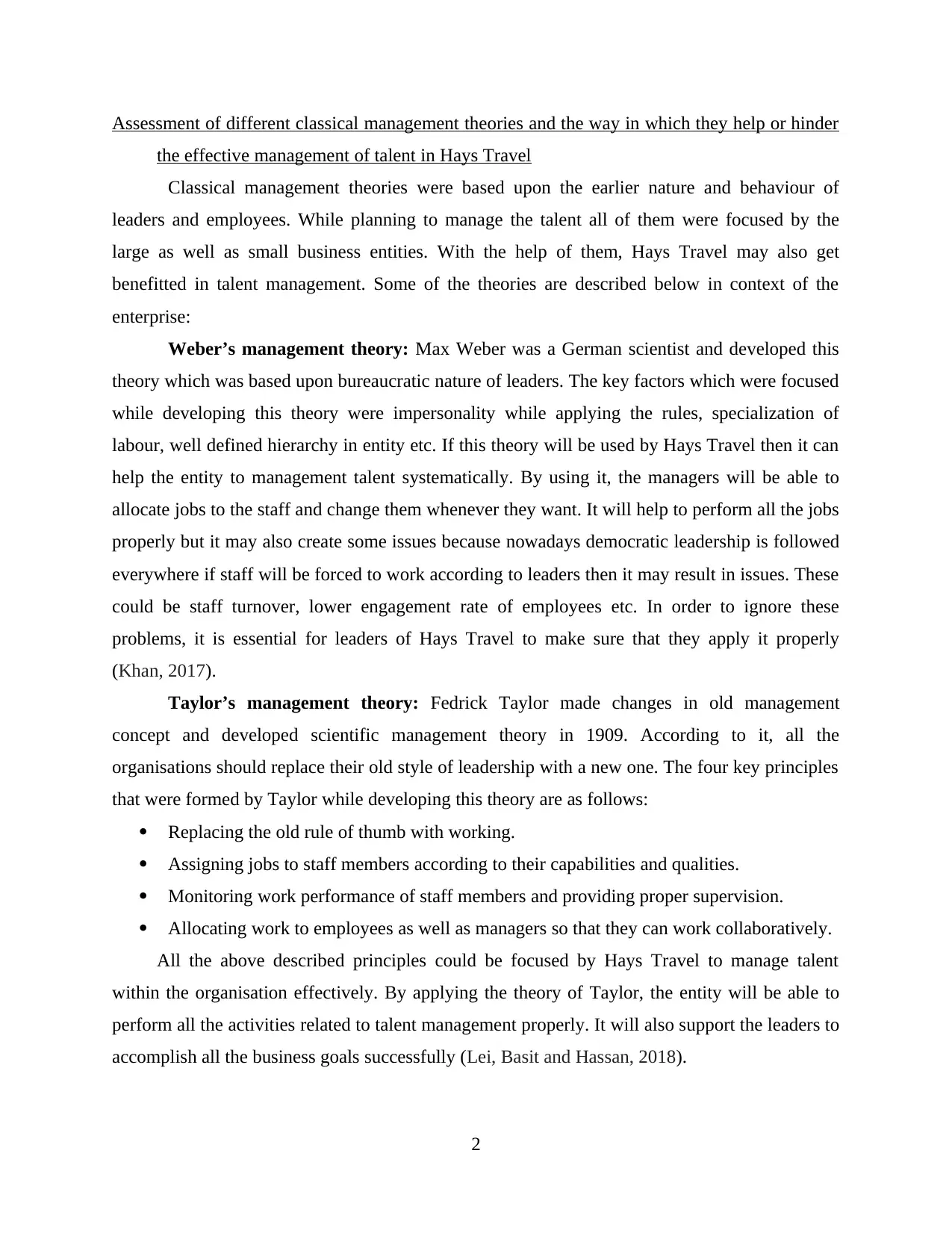
Assessment of different classical management theories and the way in which they help or hinder
the effective management of talent in Hays Travel
Classical management theories were based upon the earlier nature and behaviour of
leaders and employees. While planning to manage the talent all of them were focused by the
large as well as small business entities. With the help of them, Hays Travel may also get
benefitted in talent management. Some of the theories are described below in context of the
enterprise:
Weber’s management theory: Max Weber was a German scientist and developed this
theory which was based upon bureaucratic nature of leaders. The key factors which were focused
while developing this theory were impersonality while applying the rules, specialization of
labour, well defined hierarchy in entity etc. If this theory will be used by Hays Travel then it can
help the entity to management talent systematically. By using it, the managers will be able to
allocate jobs to the staff and change them whenever they want. It will help to perform all the jobs
properly but it may also create some issues because nowadays democratic leadership is followed
everywhere if staff will be forced to work according to leaders then it may result in issues. These
could be staff turnover, lower engagement rate of employees etc. In order to ignore these
problems, it is essential for leaders of Hays Travel to make sure that they apply it properly
(Khan, 2017).
Taylor’s management theory: Fedrick Taylor made changes in old management
concept and developed scientific management theory in 1909. According to it, all the
organisations should replace their old style of leadership with a new one. The four key principles
that were formed by Taylor while developing this theory are as follows:
Replacing the old rule of thumb with working.
Assigning jobs to staff members according to their capabilities and qualities.
Monitoring work performance of staff members and providing proper supervision.
Allocating work to employees as well as managers so that they can work collaboratively.
All the above described principles could be focused by Hays Travel to manage talent
within the organisation effectively. By applying the theory of Taylor, the entity will be able to
perform all the activities related to talent management properly. It will also support the leaders to
accomplish all the business goals successfully (Lei, Basit and Hassan, 2018).
2
the effective management of talent in Hays Travel
Classical management theories were based upon the earlier nature and behaviour of
leaders and employees. While planning to manage the talent all of them were focused by the
large as well as small business entities. With the help of them, Hays Travel may also get
benefitted in talent management. Some of the theories are described below in context of the
enterprise:
Weber’s management theory: Max Weber was a German scientist and developed this
theory which was based upon bureaucratic nature of leaders. The key factors which were focused
while developing this theory were impersonality while applying the rules, specialization of
labour, well defined hierarchy in entity etc. If this theory will be used by Hays Travel then it can
help the entity to management talent systematically. By using it, the managers will be able to
allocate jobs to the staff and change them whenever they want. It will help to perform all the jobs
properly but it may also create some issues because nowadays democratic leadership is followed
everywhere if staff will be forced to work according to leaders then it may result in issues. These
could be staff turnover, lower engagement rate of employees etc. In order to ignore these
problems, it is essential for leaders of Hays Travel to make sure that they apply it properly
(Khan, 2017).
Taylor’s management theory: Fedrick Taylor made changes in old management
concept and developed scientific management theory in 1909. According to it, all the
organisations should replace their old style of leadership with a new one. The four key principles
that were formed by Taylor while developing this theory are as follows:
Replacing the old rule of thumb with working.
Assigning jobs to staff members according to their capabilities and qualities.
Monitoring work performance of staff members and providing proper supervision.
Allocating work to employees as well as managers so that they can work collaboratively.
All the above described principles could be focused by Hays Travel to manage talent
within the organisation effectively. By applying the theory of Taylor, the entity will be able to
perform all the activities related to talent management properly. It will also support the leaders to
accomplish all the business goals successfully (Lei, Basit and Hassan, 2018).
2
Paraphrase This Document
Need a fresh take? Get an instant paraphrase of this document with our AI Paraphraser
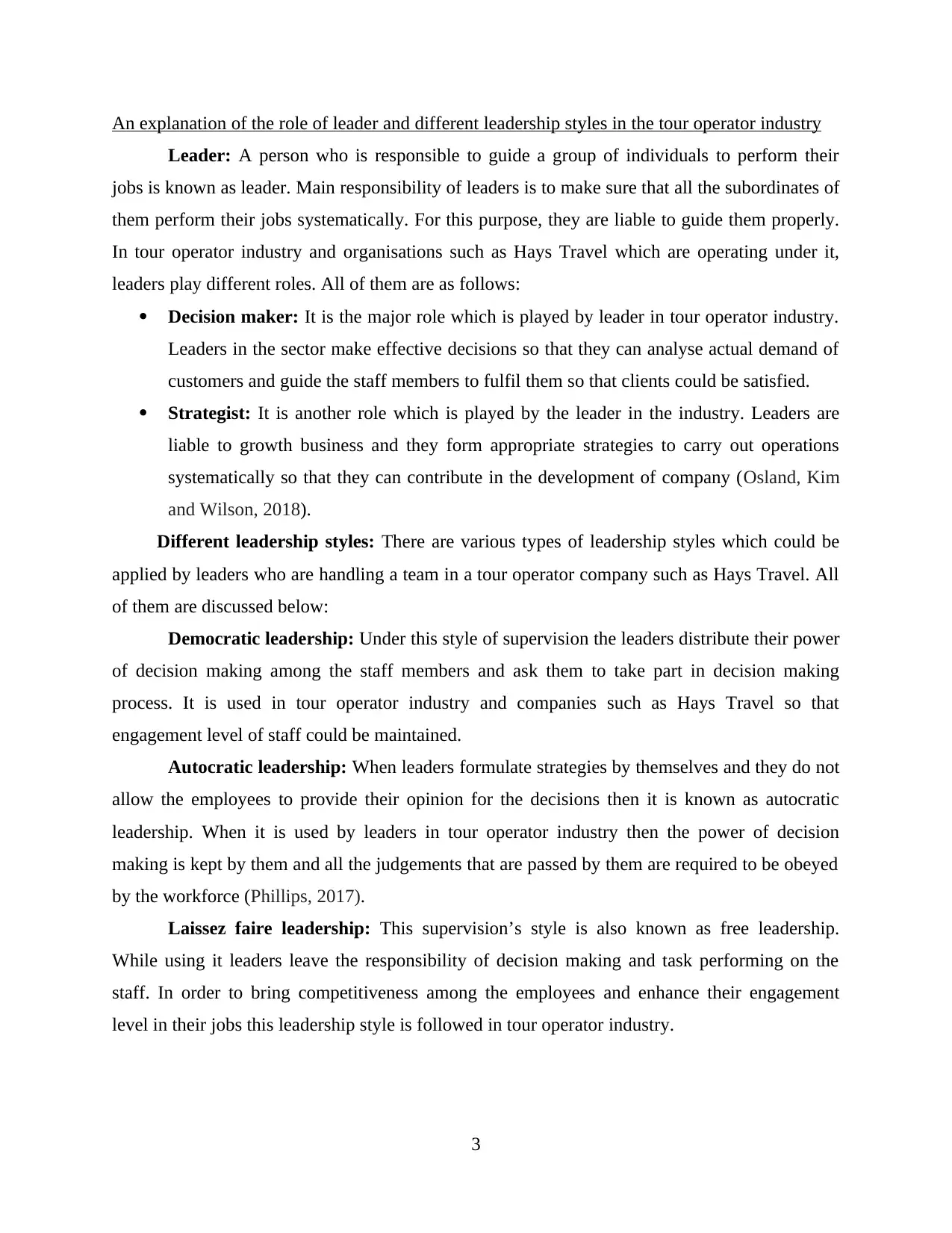
An explanation of the role of leader and different leadership styles in the tour operator industry
Leader: A person who is responsible to guide a group of individuals to perform their
jobs is known as leader. Main responsibility of leaders is to make sure that all the subordinates of
them perform their jobs systematically. For this purpose, they are liable to guide them properly.
In tour operator industry and organisations such as Hays Travel which are operating under it,
leaders play different roles. All of them are as follows:
Decision maker: It is the major role which is played by leader in tour operator industry.
Leaders in the sector make effective decisions so that they can analyse actual demand of
customers and guide the staff members to fulfil them so that clients could be satisfied.
Strategist: It is another role which is played by the leader in the industry. Leaders are
liable to growth business and they form appropriate strategies to carry out operations
systematically so that they can contribute in the development of company (Osland, Kim
and Wilson, 2018).
Different leadership styles: There are various types of leadership styles which could be
applied by leaders who are handling a team in a tour operator company such as Hays Travel. All
of them are discussed below:
Democratic leadership: Under this style of supervision the leaders distribute their power
of decision making among the staff members and ask them to take part in decision making
process. It is used in tour operator industry and companies such as Hays Travel so that
engagement level of staff could be maintained.
Autocratic leadership: When leaders formulate strategies by themselves and they do not
allow the employees to provide their opinion for the decisions then it is known as autocratic
leadership. When it is used by leaders in tour operator industry then the power of decision
making is kept by them and all the judgements that are passed by them are required to be obeyed
by the workforce (Phillips, 2017).
Laissez faire leadership: This supervision’s style is also known as free leadership.
While using it leaders leave the responsibility of decision making and task performing on the
staff. In order to bring competitiveness among the employees and enhance their engagement
level in their jobs this leadership style is followed in tour operator industry.
3
Leader: A person who is responsible to guide a group of individuals to perform their
jobs is known as leader. Main responsibility of leaders is to make sure that all the subordinates of
them perform their jobs systematically. For this purpose, they are liable to guide them properly.
In tour operator industry and organisations such as Hays Travel which are operating under it,
leaders play different roles. All of them are as follows:
Decision maker: It is the major role which is played by leader in tour operator industry.
Leaders in the sector make effective decisions so that they can analyse actual demand of
customers and guide the staff members to fulfil them so that clients could be satisfied.
Strategist: It is another role which is played by the leader in the industry. Leaders are
liable to growth business and they form appropriate strategies to carry out operations
systematically so that they can contribute in the development of company (Osland, Kim
and Wilson, 2018).
Different leadership styles: There are various types of leadership styles which could be
applied by leaders who are handling a team in a tour operator company such as Hays Travel. All
of them are discussed below:
Democratic leadership: Under this style of supervision the leaders distribute their power
of decision making among the staff members and ask them to take part in decision making
process. It is used in tour operator industry and companies such as Hays Travel so that
engagement level of staff could be maintained.
Autocratic leadership: When leaders formulate strategies by themselves and they do not
allow the employees to provide their opinion for the decisions then it is known as autocratic
leadership. When it is used by leaders in tour operator industry then the power of decision
making is kept by them and all the judgements that are passed by them are required to be obeyed
by the workforce (Phillips, 2017).
Laissez faire leadership: This supervision’s style is also known as free leadership.
While using it leaders leave the responsibility of decision making and task performing on the
staff. In order to bring competitiveness among the employees and enhance their engagement
level in their jobs this leadership style is followed in tour operator industry.
3
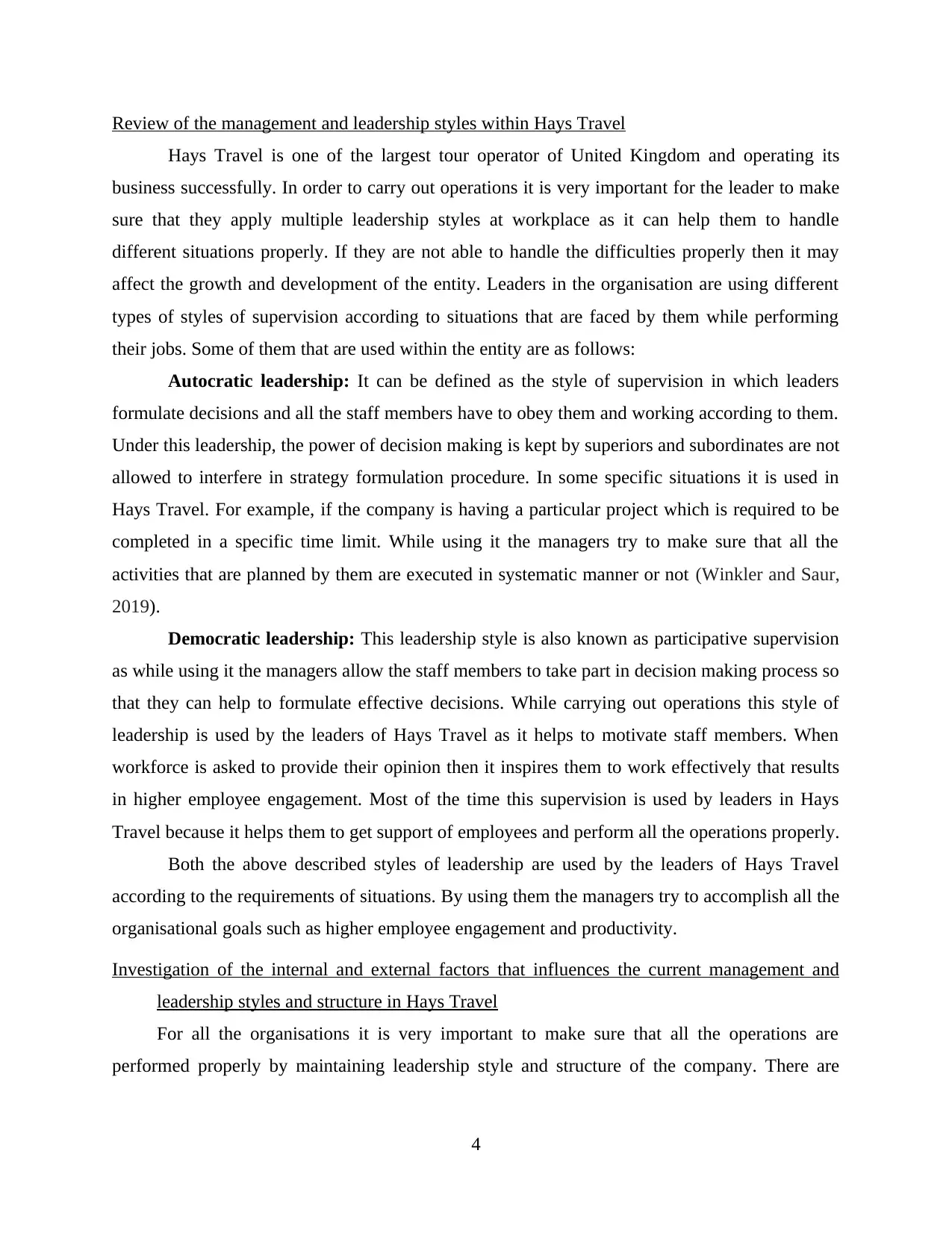
Review of the management and leadership styles within Hays Travel
Hays Travel is one of the largest tour operator of United Kingdom and operating its
business successfully. In order to carry out operations it is very important for the leader to make
sure that they apply multiple leadership styles at workplace as it can help them to handle
different situations properly. If they are not able to handle the difficulties properly then it may
affect the growth and development of the entity. Leaders in the organisation are using different
types of styles of supervision according to situations that are faced by them while performing
their jobs. Some of them that are used within the entity are as follows:
Autocratic leadership: It can be defined as the style of supervision in which leaders
formulate decisions and all the staff members have to obey them and working according to them.
Under this leadership, the power of decision making is kept by superiors and subordinates are not
allowed to interfere in strategy formulation procedure. In some specific situations it is used in
Hays Travel. For example, if the company is having a particular project which is required to be
completed in a specific time limit. While using it the managers try to make sure that all the
activities that are planned by them are executed in systematic manner or not (Winkler and Saur,
2019).
Democratic leadership: This leadership style is also known as participative supervision
as while using it the managers allow the staff members to take part in decision making process so
that they can help to formulate effective decisions. While carrying out operations this style of
leadership is used by the leaders of Hays Travel as it helps to motivate staff members. When
workforce is asked to provide their opinion then it inspires them to work effectively that results
in higher employee engagement. Most of the time this supervision is used by leaders in Hays
Travel because it helps them to get support of employees and perform all the operations properly.
Both the above described styles of leadership are used by the leaders of Hays Travel
according to the requirements of situations. By using them the managers try to accomplish all the
organisational goals such as higher employee engagement and productivity.
Investigation of the internal and external factors that influences the current management and
leadership styles and structure in Hays Travel
For all the organisations it is very important to make sure that all the operations are
performed properly by maintaining leadership style and structure of the company. There are
4
Hays Travel is one of the largest tour operator of United Kingdom and operating its
business successfully. In order to carry out operations it is very important for the leader to make
sure that they apply multiple leadership styles at workplace as it can help them to handle
different situations properly. If they are not able to handle the difficulties properly then it may
affect the growth and development of the entity. Leaders in the organisation are using different
types of styles of supervision according to situations that are faced by them while performing
their jobs. Some of them that are used within the entity are as follows:
Autocratic leadership: It can be defined as the style of supervision in which leaders
formulate decisions and all the staff members have to obey them and working according to them.
Under this leadership, the power of decision making is kept by superiors and subordinates are not
allowed to interfere in strategy formulation procedure. In some specific situations it is used in
Hays Travel. For example, if the company is having a particular project which is required to be
completed in a specific time limit. While using it the managers try to make sure that all the
activities that are planned by them are executed in systematic manner or not (Winkler and Saur,
2019).
Democratic leadership: This leadership style is also known as participative supervision
as while using it the managers allow the staff members to take part in decision making process so
that they can help to formulate effective decisions. While carrying out operations this style of
leadership is used by the leaders of Hays Travel as it helps to motivate staff members. When
workforce is asked to provide their opinion then it inspires them to work effectively that results
in higher employee engagement. Most of the time this supervision is used by leaders in Hays
Travel because it helps them to get support of employees and perform all the operations properly.
Both the above described styles of leadership are used by the leaders of Hays Travel
according to the requirements of situations. By using them the managers try to accomplish all the
organisational goals such as higher employee engagement and productivity.
Investigation of the internal and external factors that influences the current management and
leadership styles and structure in Hays Travel
For all the organisations it is very important to make sure that all the operations are
performed properly by maintaining leadership style and structure of the company. There are
4
⊘ This is a preview!⊘
Do you want full access?
Subscribe today to unlock all pages.

Trusted by 1+ million students worldwide
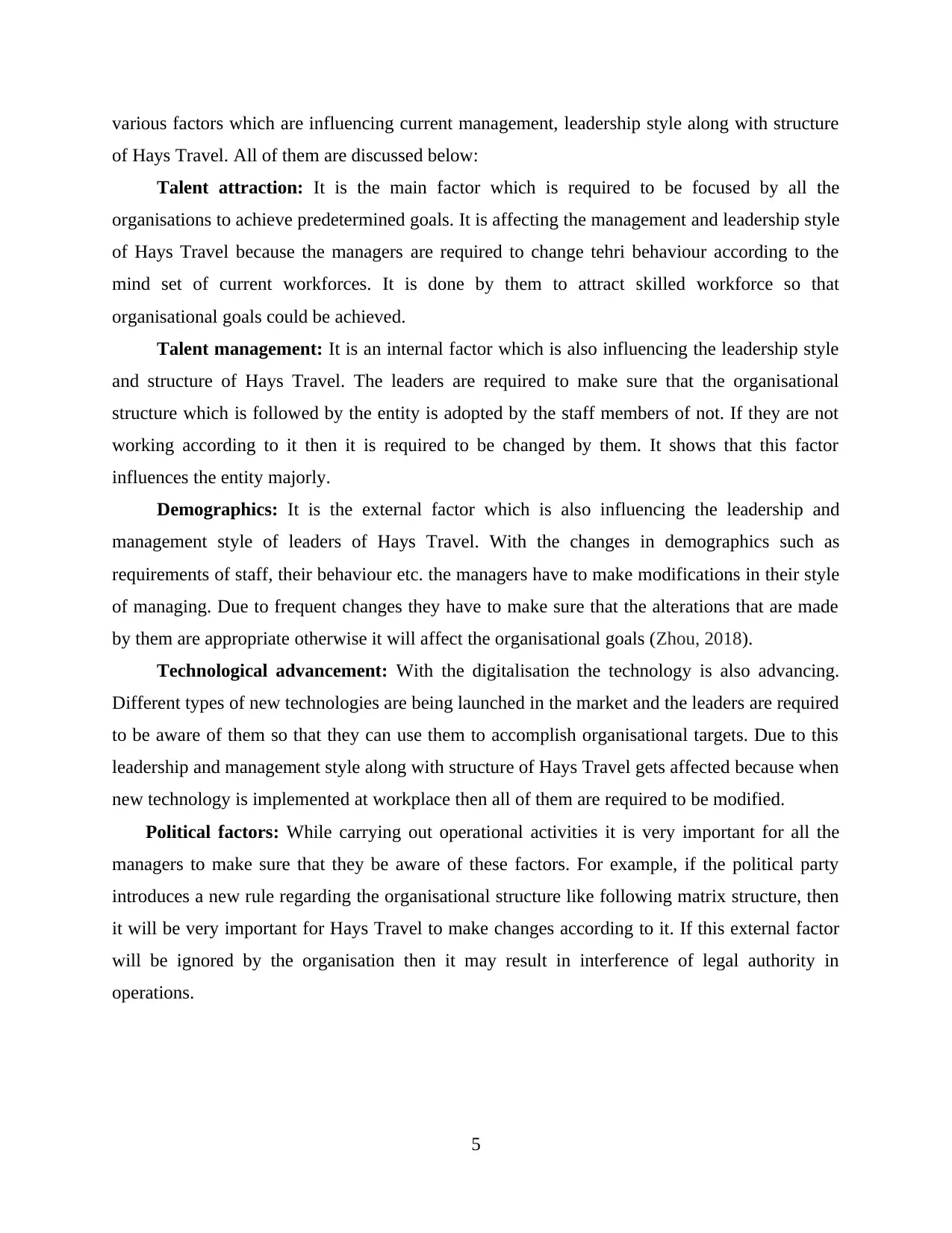
various factors which are influencing current management, leadership style along with structure
of Hays Travel. All of them are discussed below:
Talent attraction: It is the main factor which is required to be focused by all the
organisations to achieve predetermined goals. It is affecting the management and leadership style
of Hays Travel because the managers are required to change tehri behaviour according to the
mind set of current workforces. It is done by them to attract skilled workforce so that
organisational goals could be achieved.
Talent management: It is an internal factor which is also influencing the leadership style
and structure of Hays Travel. The leaders are required to make sure that the organisational
structure which is followed by the entity is adopted by the staff members of not. If they are not
working according to it then it is required to be changed by them. It shows that this factor
influences the entity majorly.
Demographics: It is the external factor which is also influencing the leadership and
management style of leaders of Hays Travel. With the changes in demographics such as
requirements of staff, their behaviour etc. the managers have to make modifications in their style
of managing. Due to frequent changes they have to make sure that the alterations that are made
by them are appropriate otherwise it will affect the organisational goals (Zhou, 2018).
Technological advancement: With the digitalisation the technology is also advancing.
Different types of new technologies are being launched in the market and the leaders are required
to be aware of them so that they can use them to accomplish organisational targets. Due to this
leadership and management style along with structure of Hays Travel gets affected because when
new technology is implemented at workplace then all of them are required to be modified.
Political factors: While carrying out operational activities it is very important for all the
managers to make sure that they be aware of these factors. For example, if the political party
introduces a new rule regarding the organisational structure like following matrix structure, then
it will be very important for Hays Travel to make changes according to it. If this external factor
will be ignored by the organisation then it may result in interference of legal authority in
operations.
5
of Hays Travel. All of them are discussed below:
Talent attraction: It is the main factor which is required to be focused by all the
organisations to achieve predetermined goals. It is affecting the management and leadership style
of Hays Travel because the managers are required to change tehri behaviour according to the
mind set of current workforces. It is done by them to attract skilled workforce so that
organisational goals could be achieved.
Talent management: It is an internal factor which is also influencing the leadership style
and structure of Hays Travel. The leaders are required to make sure that the organisational
structure which is followed by the entity is adopted by the staff members of not. If they are not
working according to it then it is required to be changed by them. It shows that this factor
influences the entity majorly.
Demographics: It is the external factor which is also influencing the leadership and
management style of leaders of Hays Travel. With the changes in demographics such as
requirements of staff, their behaviour etc. the managers have to make modifications in their style
of managing. Due to frequent changes they have to make sure that the alterations that are made
by them are appropriate otherwise it will affect the organisational goals (Zhou, 2018).
Technological advancement: With the digitalisation the technology is also advancing.
Different types of new technologies are being launched in the market and the leaders are required
to be aware of them so that they can use them to accomplish organisational targets. Due to this
leadership and management style along with structure of Hays Travel gets affected because when
new technology is implemented at workplace then all of them are required to be modified.
Political factors: While carrying out operational activities it is very important for all the
managers to make sure that they be aware of these factors. For example, if the political party
introduces a new rule regarding the organisational structure like following matrix structure, then
it will be very important for Hays Travel to make changes according to it. If this external factor
will be ignored by the organisation then it may result in interference of legal authority in
operations.
5
Paraphrase This Document
Need a fresh take? Get an instant paraphrase of this document with our AI Paraphraser
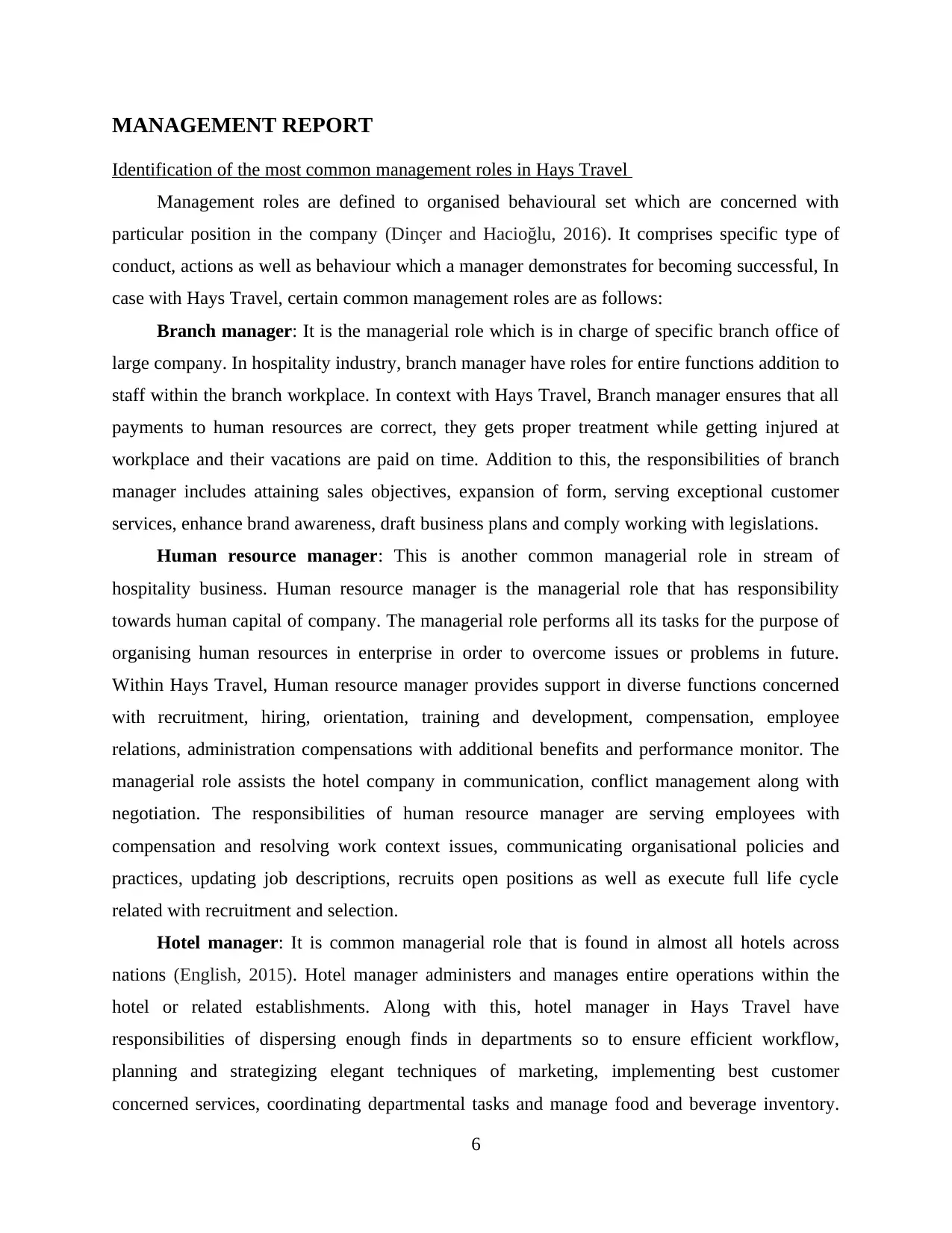
MANAGEMENT REPORT
Identification of the most common management roles in Hays Travel
Management roles are defined to organised behavioural set which are concerned with
particular position in the company (Dinçer and Hacioğlu, 2016). It comprises specific type of
conduct, actions as well as behaviour which a manager demonstrates for becoming successful, In
case with Hays Travel, certain common management roles are as follows:
Branch manager: It is the managerial role which is in charge of specific branch office of
large company. In hospitality industry, branch manager have roles for entire functions addition to
staff within the branch workplace. In context with Hays Travel, Branch manager ensures that all
payments to human resources are correct, they gets proper treatment while getting injured at
workplace and their vacations are paid on time. Addition to this, the responsibilities of branch
manager includes attaining sales objectives, expansion of form, serving exceptional customer
services, enhance brand awareness, draft business plans and comply working with legislations.
Human resource manager: This is another common managerial role in stream of
hospitality business. Human resource manager is the managerial role that has responsibility
towards human capital of company. The managerial role performs all its tasks for the purpose of
organising human resources in enterprise in order to overcome issues or problems in future.
Within Hays Travel, Human resource manager provides support in diverse functions concerned
with recruitment, hiring, orientation, training and development, compensation, employee
relations, administration compensations with additional benefits and performance monitor. The
managerial role assists the hotel company in communication, conflict management along with
negotiation. The responsibilities of human resource manager are serving employees with
compensation and resolving work context issues, communicating organisational policies and
practices, updating job descriptions, recruits open positions as well as execute full life cycle
related with recruitment and selection.
Hotel manager: It is common managerial role that is found in almost all hotels across
nations (English, 2015). Hotel manager administers and manages entire operations within the
hotel or related establishments. Along with this, hotel manager in Hays Travel have
responsibilities of dispersing enough finds in departments so to ensure efficient workflow,
planning and strategizing elegant techniques of marketing, implementing best customer
concerned services, coordinating departmental tasks and manage food and beverage inventory.
6
Identification of the most common management roles in Hays Travel
Management roles are defined to organised behavioural set which are concerned with
particular position in the company (Dinçer and Hacioğlu, 2016). It comprises specific type of
conduct, actions as well as behaviour which a manager demonstrates for becoming successful, In
case with Hays Travel, certain common management roles are as follows:
Branch manager: It is the managerial role which is in charge of specific branch office of
large company. In hospitality industry, branch manager have roles for entire functions addition to
staff within the branch workplace. In context with Hays Travel, Branch manager ensures that all
payments to human resources are correct, they gets proper treatment while getting injured at
workplace and their vacations are paid on time. Addition to this, the responsibilities of branch
manager includes attaining sales objectives, expansion of form, serving exceptional customer
services, enhance brand awareness, draft business plans and comply working with legislations.
Human resource manager: This is another common managerial role in stream of
hospitality business. Human resource manager is the managerial role that has responsibility
towards human capital of company. The managerial role performs all its tasks for the purpose of
organising human resources in enterprise in order to overcome issues or problems in future.
Within Hays Travel, Human resource manager provides support in diverse functions concerned
with recruitment, hiring, orientation, training and development, compensation, employee
relations, administration compensations with additional benefits and performance monitor. The
managerial role assists the hotel company in communication, conflict management along with
negotiation. The responsibilities of human resource manager are serving employees with
compensation and resolving work context issues, communicating organisational policies and
practices, updating job descriptions, recruits open positions as well as execute full life cycle
related with recruitment and selection.
Hotel manager: It is common managerial role that is found in almost all hotels across
nations (English, 2015). Hotel manager administers and manages entire operations within the
hotel or related establishments. Along with this, hotel manager in Hays Travel have
responsibilities of dispersing enough finds in departments so to ensure efficient workflow,
planning and strategizing elegant techniques of marketing, implementing best customer
concerned services, coordinating departmental tasks and manage food and beverage inventory.
6
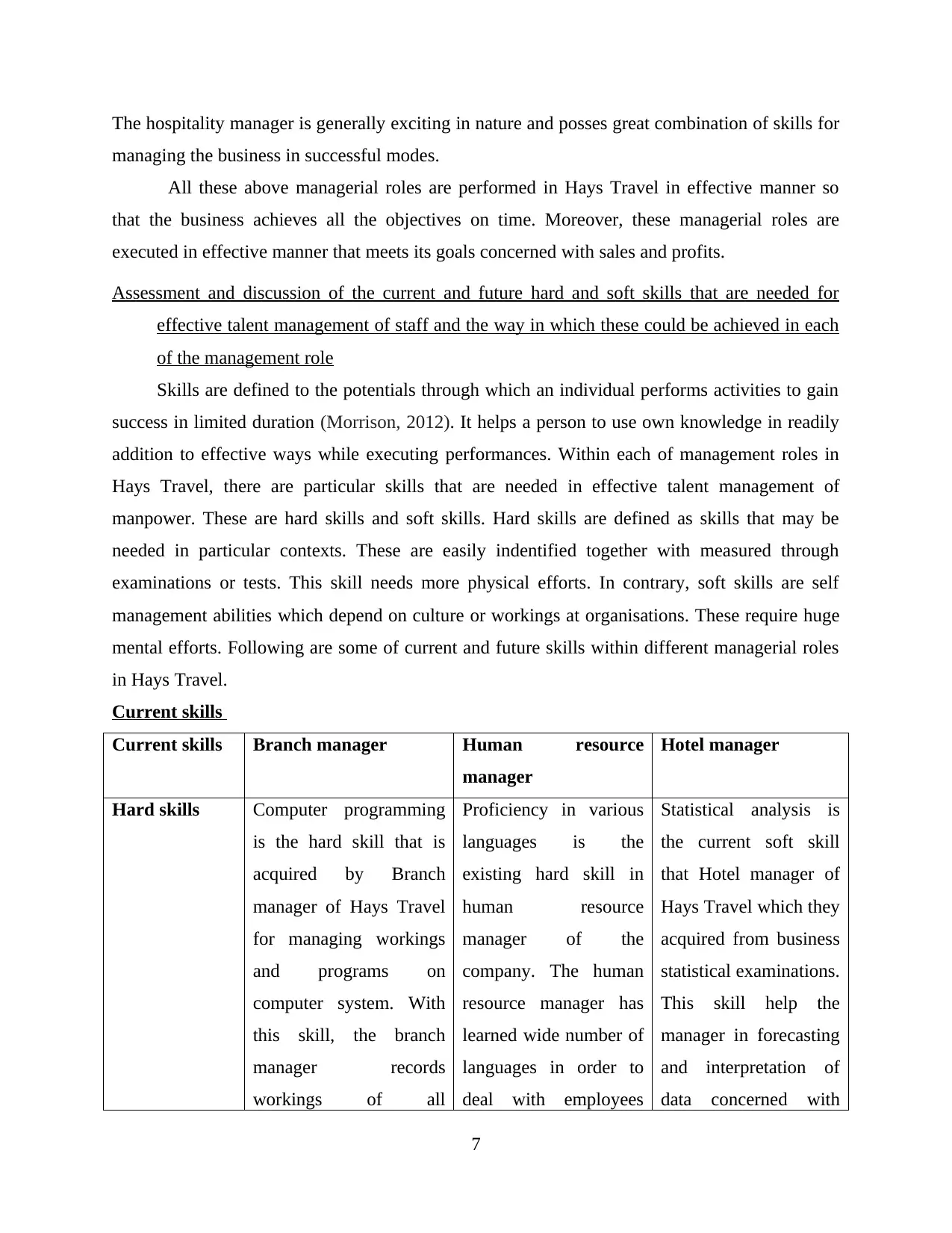
The hospitality manager is generally exciting in nature and posses great combination of skills for
managing the business in successful modes.
All these above managerial roles are performed in Hays Travel in effective manner so
that the business achieves all the objectives on time. Moreover, these managerial roles are
executed in effective manner that meets its goals concerned with sales and profits.
Assessment and discussion of the current and future hard and soft skills that are needed for
effective talent management of staff and the way in which these could be achieved in each
of the management role
Skills are defined to the potentials through which an individual performs activities to gain
success in limited duration (Morrison, 2012). It helps a person to use own knowledge in readily
addition to effective ways while executing performances. Within each of management roles in
Hays Travel, there are particular skills that are needed in effective talent management of
manpower. These are hard skills and soft skills. Hard skills are defined as skills that may be
needed in particular contexts. These are easily indentified together with measured through
examinations or tests. This skill needs more physical efforts. In contrary, soft skills are self
management abilities which depend on culture or workings at organisations. These require huge
mental efforts. Following are some of current and future skills within different managerial roles
in Hays Travel.
Current skills
Current skills Branch manager Human resource
manager
Hotel manager
Hard skills Computer programming
is the hard skill that is
acquired by Branch
manager of Hays Travel
for managing workings
and programs on
computer system. With
this skill, the branch
manager records
workings of all
Proficiency in various
languages is the
existing hard skill in
human resource
manager of the
company. The human
resource manager has
learned wide number of
languages in order to
deal with employees
Statistical analysis is
the current soft skill
that Hotel manager of
Hays Travel which they
acquired from business
statistical examinations.
This skill help the
manager in forecasting
and interpretation of
data concerned with
7
managing the business in successful modes.
All these above managerial roles are performed in Hays Travel in effective manner so
that the business achieves all the objectives on time. Moreover, these managerial roles are
executed in effective manner that meets its goals concerned with sales and profits.
Assessment and discussion of the current and future hard and soft skills that are needed for
effective talent management of staff and the way in which these could be achieved in each
of the management role
Skills are defined to the potentials through which an individual performs activities to gain
success in limited duration (Morrison, 2012). It helps a person to use own knowledge in readily
addition to effective ways while executing performances. Within each of management roles in
Hays Travel, there are particular skills that are needed in effective talent management of
manpower. These are hard skills and soft skills. Hard skills are defined as skills that may be
needed in particular contexts. These are easily indentified together with measured through
examinations or tests. This skill needs more physical efforts. In contrary, soft skills are self
management abilities which depend on culture or workings at organisations. These require huge
mental efforts. Following are some of current and future skills within different managerial roles
in Hays Travel.
Current skills
Current skills Branch manager Human resource
manager
Hotel manager
Hard skills Computer programming
is the hard skill that is
acquired by Branch
manager of Hays Travel
for managing workings
and programs on
computer system. With
this skill, the branch
manager records
workings of all
Proficiency in various
languages is the
existing hard skill in
human resource
manager of the
company. The human
resource manager has
learned wide number of
languages in order to
deal with employees
Statistical analysis is
the current soft skill
that Hotel manager of
Hays Travel which they
acquired from business
statistical examinations.
This skill help the
manager in forecasting
and interpretation of
data concerned with
7
⊘ This is a preview!⊘
Do you want full access?
Subscribe today to unlock all pages.

Trusted by 1+ million students worldwide
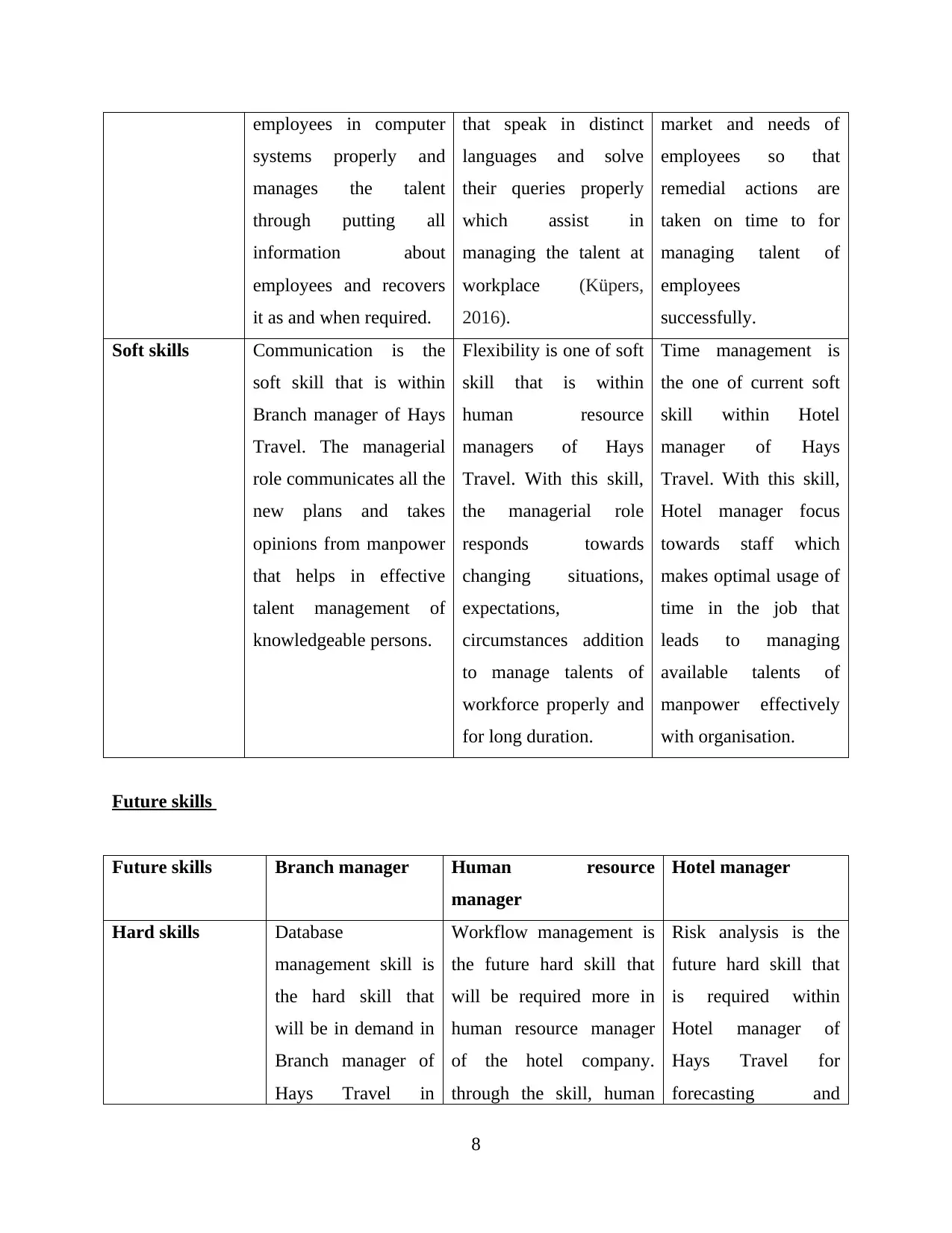
employees in computer
systems properly and
manages the talent
through putting all
information about
employees and recovers
it as and when required.
that speak in distinct
languages and solve
their queries properly
which assist in
managing the talent at
workplace (Küpers,
2016).
market and needs of
employees so that
remedial actions are
taken on time to for
managing talent of
employees
successfully.
Soft skills Communication is the
soft skill that is within
Branch manager of Hays
Travel. The managerial
role communicates all the
new plans and takes
opinions from manpower
that helps in effective
talent management of
knowledgeable persons.
Flexibility is one of soft
skill that is within
human resource
managers of Hays
Travel. With this skill,
the managerial role
responds towards
changing situations,
expectations,
circumstances addition
to manage talents of
workforce properly and
for long duration.
Time management is
the one of current soft
skill within Hotel
manager of Hays
Travel. With this skill,
Hotel manager focus
towards staff which
makes optimal usage of
time in the job that
leads to managing
available talents of
manpower effectively
with organisation.
Future skills
Future skills Branch manager Human resource
manager
Hotel manager
Hard skills Database
management skill is
the hard skill that
will be in demand in
Branch manager of
Hays Travel in
Workflow management is
the future hard skill that
will be required more in
human resource manager
of the hotel company.
through the skill, human
Risk analysis is the
future hard skill that
is required within
Hotel manager of
Hays Travel for
forecasting and
8
systems properly and
manages the talent
through putting all
information about
employees and recovers
it as and when required.
that speak in distinct
languages and solve
their queries properly
which assist in
managing the talent at
workplace (Küpers,
2016).
market and needs of
employees so that
remedial actions are
taken on time to for
managing talent of
employees
successfully.
Soft skills Communication is the
soft skill that is within
Branch manager of Hays
Travel. The managerial
role communicates all the
new plans and takes
opinions from manpower
that helps in effective
talent management of
knowledgeable persons.
Flexibility is one of soft
skill that is within
human resource
managers of Hays
Travel. With this skill,
the managerial role
responds towards
changing situations,
expectations,
circumstances addition
to manage talents of
workforce properly and
for long duration.
Time management is
the one of current soft
skill within Hotel
manager of Hays
Travel. With this skill,
Hotel manager focus
towards staff which
makes optimal usage of
time in the job that
leads to managing
available talents of
manpower effectively
with organisation.
Future skills
Future skills Branch manager Human resource
manager
Hotel manager
Hard skills Database
management skill is
the hard skill that
will be in demand in
Branch manager of
Hays Travel in
Workflow management is
the future hard skill that
will be required more in
human resource manager
of the hotel company.
through the skill, human
Risk analysis is the
future hard skill that
is required within
Hotel manager of
Hays Travel for
forecasting and
8
Paraphrase This Document
Need a fresh take? Get an instant paraphrase of this document with our AI Paraphraser
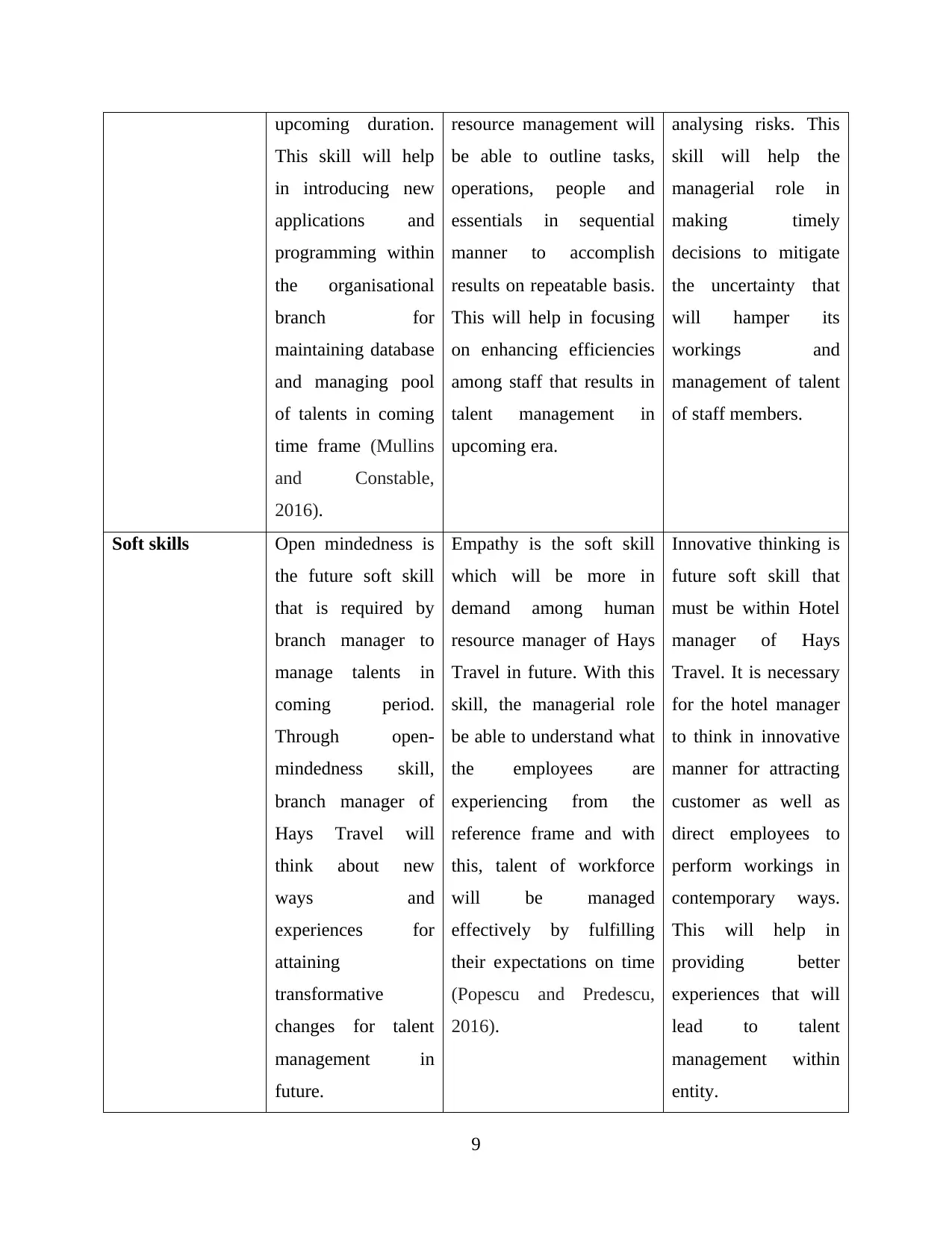
upcoming duration.
This skill will help
in introducing new
applications and
programming within
the organisational
branch for
maintaining database
and managing pool
of talents in coming
time frame (Mullins
and Constable,
2016).
resource management will
be able to outline tasks,
operations, people and
essentials in sequential
manner to accomplish
results on repeatable basis.
This will help in focusing
on enhancing efficiencies
among staff that results in
talent management in
upcoming era.
analysing risks. This
skill will help the
managerial role in
making timely
decisions to mitigate
the uncertainty that
will hamper its
workings and
management of talent
of staff members.
Soft skills Open mindedness is
the future soft skill
that is required by
branch manager to
manage talents in
coming period.
Through open-
mindedness skill,
branch manager of
Hays Travel will
think about new
ways and
experiences for
attaining
transformative
changes for talent
management in
future.
Empathy is the soft skill
which will be more in
demand among human
resource manager of Hays
Travel in future. With this
skill, the managerial role
be able to understand what
the employees are
experiencing from the
reference frame and with
this, talent of workforce
will be managed
effectively by fulfilling
their expectations on time
(Popescu and Predescu,
2016).
Innovative thinking is
future soft skill that
must be within Hotel
manager of Hays
Travel. It is necessary
for the hotel manager
to think in innovative
manner for attracting
customer as well as
direct employees to
perform workings in
contemporary ways.
This will help in
providing better
experiences that will
lead to talent
management within
entity.
9
This skill will help
in introducing new
applications and
programming within
the organisational
branch for
maintaining database
and managing pool
of talents in coming
time frame (Mullins
and Constable,
2016).
resource management will
be able to outline tasks,
operations, people and
essentials in sequential
manner to accomplish
results on repeatable basis.
This will help in focusing
on enhancing efficiencies
among staff that results in
talent management in
upcoming era.
analysing risks. This
skill will help the
managerial role in
making timely
decisions to mitigate
the uncertainty that
will hamper its
workings and
management of talent
of staff members.
Soft skills Open mindedness is
the future soft skill
that is required by
branch manager to
manage talents in
coming period.
Through open-
mindedness skill,
branch manager of
Hays Travel will
think about new
ways and
experiences for
attaining
transformative
changes for talent
management in
future.
Empathy is the soft skill
which will be more in
demand among human
resource manager of Hays
Travel in future. With this
skill, the managerial role
be able to understand what
the employees are
experiencing from the
reference frame and with
this, talent of workforce
will be managed
effectively by fulfilling
their expectations on time
(Popescu and Predescu,
2016).
Innovative thinking is
future soft skill that
must be within Hotel
manager of Hays
Travel. It is necessary
for the hotel manager
to think in innovative
manner for attracting
customer as well as
direct employees to
perform workings in
contemporary ways.
This will help in
providing better
experiences that will
lead to talent
management within
entity.
9
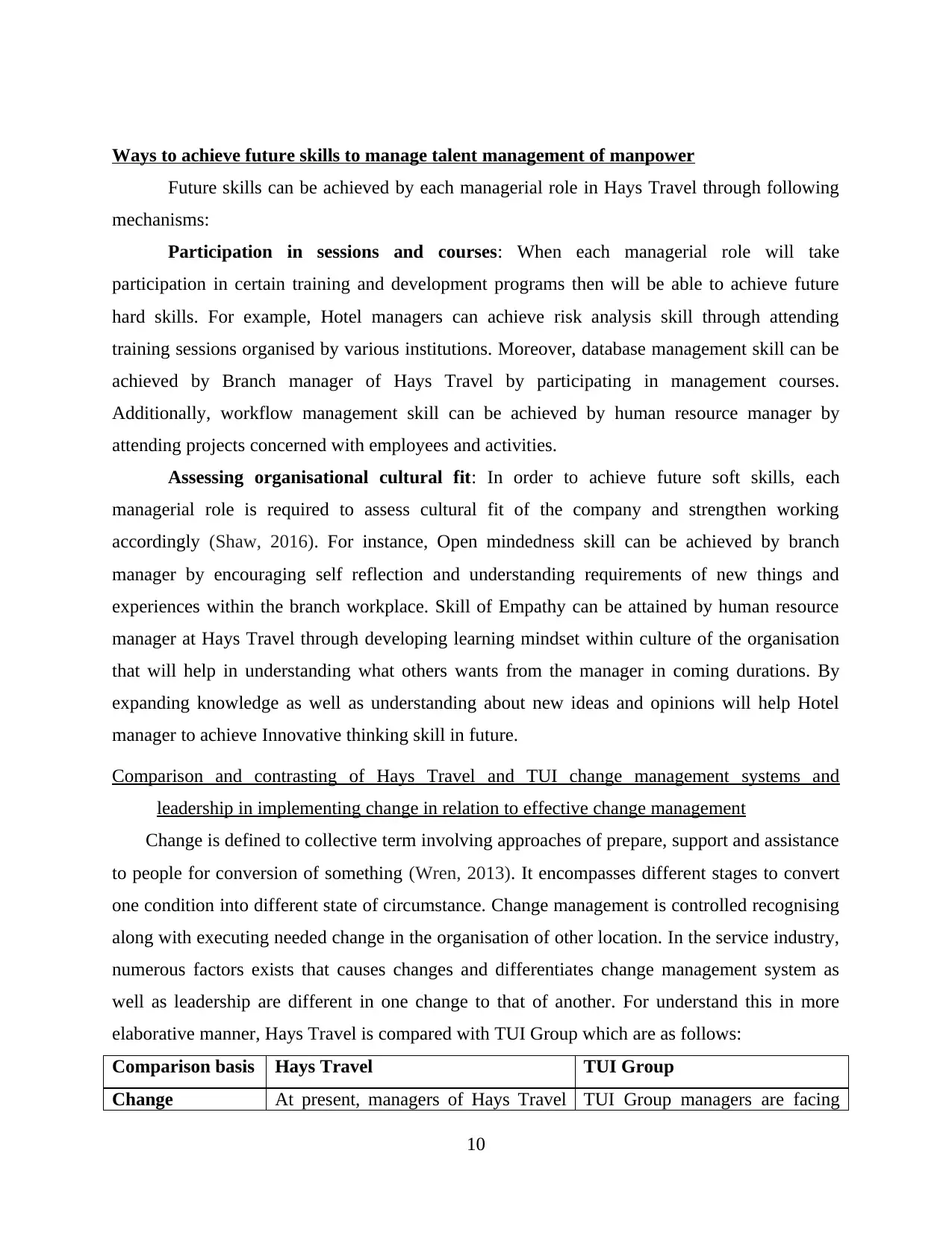
Ways to achieve future skills to manage talent management of manpower
Future skills can be achieved by each managerial role in Hays Travel through following
mechanisms:
Participation in sessions and courses: When each managerial role will take
participation in certain training and development programs then will be able to achieve future
hard skills. For example, Hotel managers can achieve risk analysis skill through attending
training sessions organised by various institutions. Moreover, database management skill can be
achieved by Branch manager of Hays Travel by participating in management courses.
Additionally, workflow management skill can be achieved by human resource manager by
attending projects concerned with employees and activities.
Assessing organisational cultural fit: In order to achieve future soft skills, each
managerial role is required to assess cultural fit of the company and strengthen working
accordingly (Shaw, 2016). For instance, Open mindedness skill can be achieved by branch
manager by encouraging self reflection and understanding requirements of new things and
experiences within the branch workplace. Skill of Empathy can be attained by human resource
manager at Hays Travel through developing learning mindset within culture of the organisation
that will help in understanding what others wants from the manager in coming durations. By
expanding knowledge as well as understanding about new ideas and opinions will help Hotel
manager to achieve Innovative thinking skill in future.
Comparison and contrasting of Hays Travel and TUI change management systems and
leadership in implementing change in relation to effective change management
Change is defined to collective term involving approaches of prepare, support and assistance
to people for conversion of something (Wren, 2013). It encompasses different stages to convert
one condition into different state of circumstance. Change management is controlled recognising
along with executing needed change in the organisation of other location. In the service industry,
numerous factors exists that causes changes and differentiates change management system as
well as leadership are different in one change to that of another. For understand this in more
elaborative manner, Hays Travel is compared with TUI Group which are as follows:
Comparison basis Hays Travel TUI Group
Change At present, managers of Hays Travel TUI Group managers are facing
10
Future skills can be achieved by each managerial role in Hays Travel through following
mechanisms:
Participation in sessions and courses: When each managerial role will take
participation in certain training and development programs then will be able to achieve future
hard skills. For example, Hotel managers can achieve risk analysis skill through attending
training sessions organised by various institutions. Moreover, database management skill can be
achieved by Branch manager of Hays Travel by participating in management courses.
Additionally, workflow management skill can be achieved by human resource manager by
attending projects concerned with employees and activities.
Assessing organisational cultural fit: In order to achieve future soft skills, each
managerial role is required to assess cultural fit of the company and strengthen working
accordingly (Shaw, 2016). For instance, Open mindedness skill can be achieved by branch
manager by encouraging self reflection and understanding requirements of new things and
experiences within the branch workplace. Skill of Empathy can be attained by human resource
manager at Hays Travel through developing learning mindset within culture of the organisation
that will help in understanding what others wants from the manager in coming durations. By
expanding knowledge as well as understanding about new ideas and opinions will help Hotel
manager to achieve Innovative thinking skill in future.
Comparison and contrasting of Hays Travel and TUI change management systems and
leadership in implementing change in relation to effective change management
Change is defined to collective term involving approaches of prepare, support and assistance
to people for conversion of something (Wren, 2013). It encompasses different stages to convert
one condition into different state of circumstance. Change management is controlled recognising
along with executing needed change in the organisation of other location. In the service industry,
numerous factors exists that causes changes and differentiates change management system as
well as leadership are different in one change to that of another. For understand this in more
elaborative manner, Hays Travel is compared with TUI Group which are as follows:
Comparison basis Hays Travel TUI Group
Change At present, managers of Hays Travel TUI Group managers are facing
10
⊘ This is a preview!⊘
Do you want full access?
Subscribe today to unlock all pages.

Trusted by 1+ million students worldwide
1 out of 15
Related Documents
Your All-in-One AI-Powered Toolkit for Academic Success.
+13062052269
info@desklib.com
Available 24*7 on WhatsApp / Email
![[object Object]](/_next/static/media/star-bottom.7253800d.svg)
Unlock your academic potential
Copyright © 2020–2026 A2Z Services. All Rights Reserved. Developed and managed by ZUCOL.





